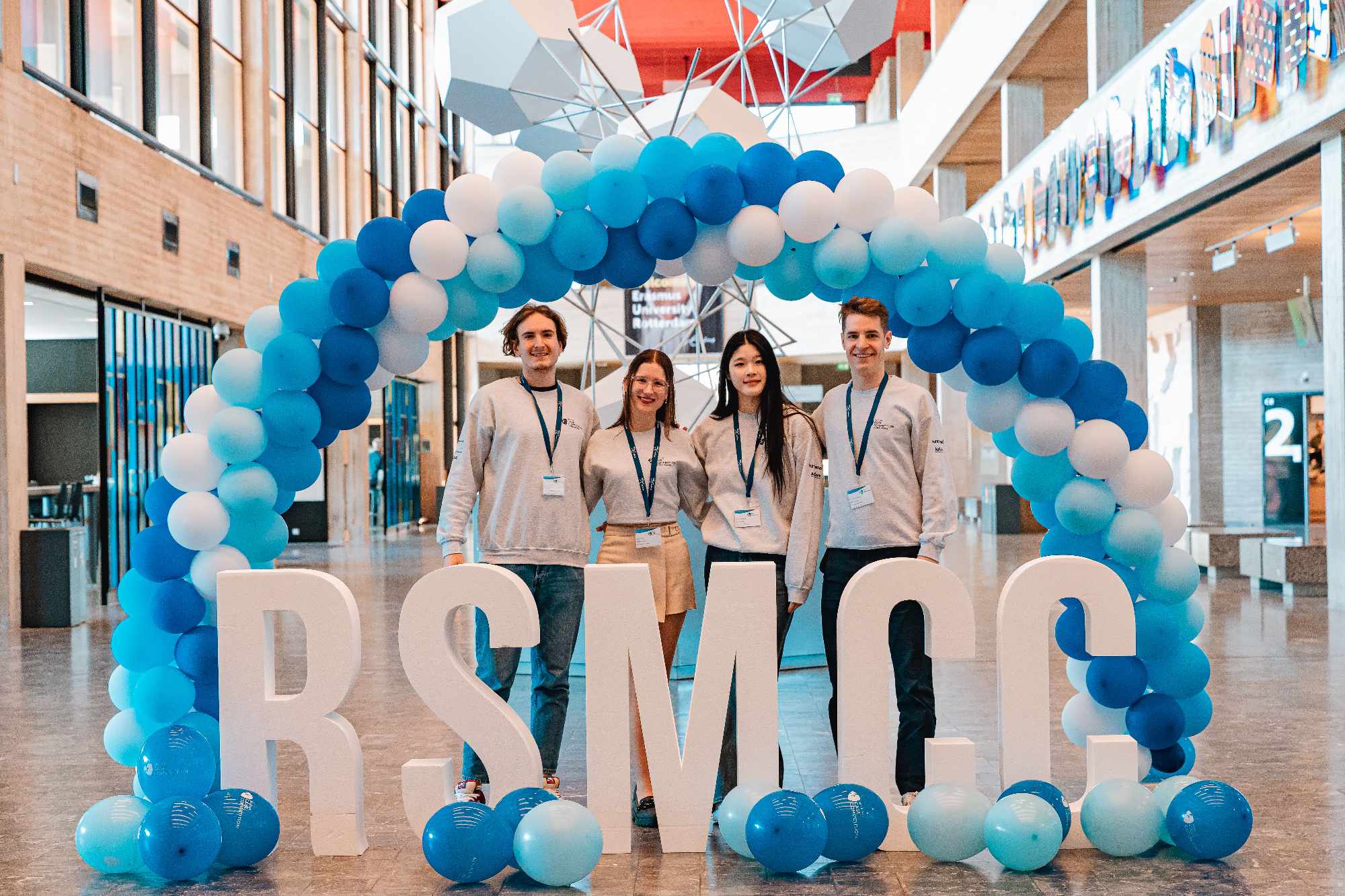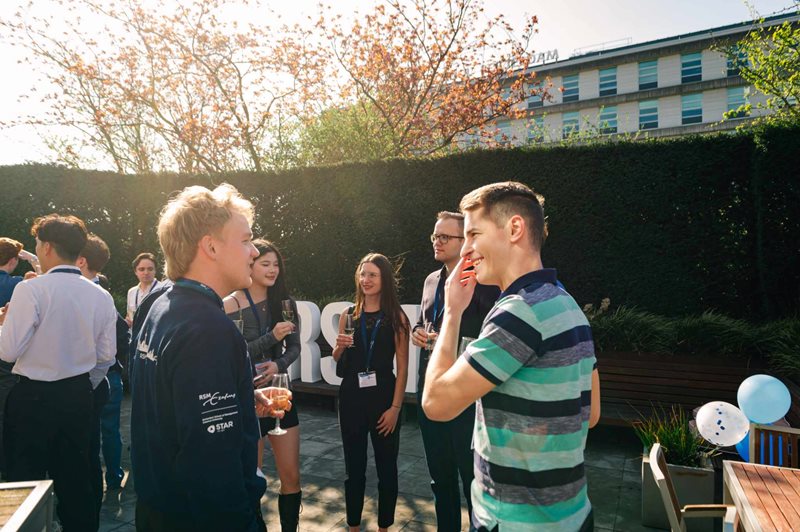The Value of Messaging: How Corvinus Balanced Strategy & Storytelling at RSMCC

The eleventh edition of the RSM STAR Case Competition in Rotterdam took place between April 4th and April 12th, organized by the Erasmus Rotterdam School of Management and the RSM STAR Case Club, where four undergraduate students from Corvinus, namely JingPei Shu (Suzy), Kende Juhász, Milán Porzsolt, and Virág Gál , proudly represented our university on the international stage.
Our team was selected and mentored by Dániel Kostyal, a PhD student at Corvinus and an active teacher and advisor on Case Track, following their successful completion of the Cases on International Business Strategy (CIBS) and Cases in Business Strategy (CBS) courses. The students’ rigorous preparation began months before the competition and involved many different aspects. As put by the advisor:
„The team solved multiple practice cases that focused on the Netherlands. There were several workshops centered around ideation when we received the case companies to prepare. We also had a strategy and frameworks workshop where we covered basic tools to help the team’s solving process. We also focused on 1on1 personal feedback, which helped identify bottlenecks and adjust the case cracking process as well.” (Dániel Kostyal)
The competition took place in person in Rotterdam and spanned a week and a half, during which participants tackled two real-life business challenges in a high-pressure environment. The exciting format of the RSM STAR Case Competition included both a short 12-hour case and a long 24-hour case.
The 12-hour case was provided by AuCom, an industrial electronics company originally founded in New Zealand but now globally active. Specializing in motor control technologies, its product portfolio includes soft starters and variable frequency drives. The challenge focused on AuCom’s expansion into the Asian market. The teams were tasked with exploring scalable and resource-efficient strategies that would allow AuCom to establish a long-term presence and competitive edge in the Asian market.
The Corvinus team, placing second in their division, recommended expanding into India, identifying it as the most promising and scalable market in Asia, and proposed a project-based entry strategy leveraging local partnerships for sustainable growth. The jury congratulated the team for their professional, analytical, and logical presentation, filled with actionable, clear messages. During the short case, the team realized the importance of presenting their messaging and capitalized on it. As remarked by Virág Gál:
“With AI constantly gaining more and more relevance and importance, the value of the messaging, Q&A, and presenting skills is the one increasing the most. It’s important to create simpler slides with simpler and more understandable messages.” (Virág Gál)
The 24-hour case came from Huhtamaki, a Finnish leader in sustainable packaging solutions, particularly known for its fiber-based technologies used by global clients like McDonald’s, Nespresso, and Starbucks. The challenge posed a complex, multi-dimensional problem framed around a strategic dilemma. As put by Kende Juhász:
„Huhtamaki faced a chicken-and-egg dilemma: to lower production costs, it must scale up, but customer adoption is slow due to higher prices and weak regulatory pressure. The challenge was to develop a strategic plan that analyzes the market, defines a compelling business model, and outlines a clear roadmap to establish Huhtamaki as the market leader in sustainable packaging within five years.” (Kende Juhász)
The team proposed launching 100% biodegradable packaging for FMCG sectors, supported by a QR code system to engage consumers and a Green Dashboard to track environmental impact and boost transparency. The jury highlighted the innovative solution and the presentation of a great strategy. Eventually, the team placed third in its respective division for the long case.
Each case was preceded by a company introduction session, during which teams could pose one question to the company representatives—an opportunity that added an extra layer of strategic planning even before the clock started. Following each case-solving period, the teams had to present their solutions in a 15-minute pitch, followed by a 10-minute Q&A session. A unique feature of the RSM STAR format is the “Challenger Round,” held after the 24-hour case, where second-placed teams from each division have one last chance to fight their way into the final round.
For the success of both presentations, it was essential to have a team that dynamically worked together, filled different roles, and helped each other overcome their shortcomings. According to Suzy the Corvinus team managed to excel at this, and got quite close personally to each other, during the long journey of RSMCC.
„I think our team had a great balance in dynamics, Virág and Milán have a relatively calm presenting style, while me and Kende have brought the energy to the stage, which has created a well-rounded and dynamic presentation.” (JingPei Shu)

The Corvinus team learned that flexibility is key. They found that clear, focused solutions often outperform complex ones, and that messaging, and delivery are just as crucial as strategy. Strong presentation skills, simple frameworks, and clear communication proved essential. Most importantly, they emphasized valuing the learning journey, not just the competition, and encouraged future teams to embrace networking and the full experience. As a message for aspiring case competitors, Milán Porzsolt said:
„It is truly worth it going through the process, and the competition is just the cherry on top. Focus on the way, not solely on the finish line, as I think you could learn even more during case-track and the preparation than in the case-comp itself. Whenever you are at a case competition, do not miss the opportunity for networking, you will have the chance to meet the global leaders of the future, so go start that awkward small-talk if you have the chance.” (Milán Porzsolt)
We would like to congratulate the team members and their advisor, Dániel Kostyal, for their amazing effort! We also want to extend a huge thank you to all the Case Track professors, invited jury guests for the case practice presentations, and CCTC mentors for their help with preparing and training our competitors. We are excited to see what other competitions we can represent our university at in the future.